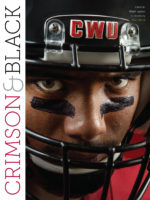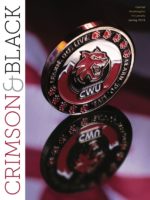When Ruby Nambo was in first grade, her teacher expressed concerns about her reading and writing ability. Nambo, who was born in Sultan, Washington, grew up in a household where only Spanish was spoken.
To help improve Nambo’s handwriting and English skills, the teacher suggested she try to write short stories.
Nambo, now a senior at Central Washington University, says it was a life-changing moment. From then on, she wrote short stories on a variety of topics, then began penning poetry after being introduced to the form in the eighth grade.
One of her earliest poems was written as a final assignment for the poetry unit in an English class. Each student had to stand in front of the class and present three poems. When it was time for Nambo to read, she set up a large tri-fold poster that showcased several of her poems.
“I wanted to take it above and beyond,” she said.
In the center of the poster was a photo of Nambo’s brother and surrounding the photo were words from a poem she wrote about her brother, who lives with a disability.
“You know, Ruby, I feel so sorry for you about your brother,” a classmate had told Nambo just before she presented her final poem, which was about her brother.
In that moment, Nambo had to decide if she would read the poem or not.
She convinced herself to press ahead because, in her heart, she felt there was a reason to. She said from that moment on, she’s prideful about her writing.
Life at CWU
Nambo is a first-generation college student who began her journey at CWU in fall 2015.
“In Sultan there [weren’t] many people of color like myself,” she said. “So, when I came here there was a lot more diversity.”
The Diversity and Equity Center (DEC), Center for Leadership and Community Engagement (CLCE), TRiO and the SSS program helped Nambo succeed along the way.
“They’ve helped me out with pushing me to do better not only in classes but also to fulfill my dreams,” Nambo said.
Nambo progressed in her time at CWU with a support system by her side.
“I realized all these great support systems I have led me to become the person I am today,” she said. “[CWU] did a great service in me to do better and to take that step of opportunity no matter where I’m at.”
Creating connections
Verónica Gómez-Vilchis, assistant director for the DEC met Nambo when she was a first-year student. At the time, Gómez-Vilchis was the adviser for Movimiento Estudiantil Chinana/o de Aztlan (MEChA).
“She was very quiet, very to herself, just watching,” Gómez-Vilchis said.
Nambo began to grow at CWU when she gained the courage to share her poems out loud, about two years after meeting Gómez-Vilchis.
Gómez-Vilchis spoke about a time when she saw a video of Nambo reading poems at a retreat. In the video, students were cheering on Nambo the entire time, full of excitement.
“I love that the students were so welcoming of her and were excited and supportive of her,” she said.
After the video, Gómez-Vilchis saw Nambo’s confidence bloom.
“Research shows when students feel like they belong, they stay longer,” Gómez-Vilchis said. “It was really important for her, as a minority, to find some people that look like her or had similar experiences as her.”
The latest edition
Nambo’s poetry will be published in the fall 2019 edition of the “New Directions for Student Leadership” journal, co-edited by Ratnesh Nagda and Larry Roper. The focus of the upcoming volume is “Centering dialogue in leadership development.”
“[Nambo] writes powerfully about leadership that emerges from communities, through community building, and for community betterment,” said Nagda, who is an independent educational consultant and former professor. “She conveys passionately the importance, urgency and resiliency of change-making today for a better tomorrow.”
Nambo and Nagda first met at a student leadership and changemaking retreat at CWU in January 2019.
Throughout the retreat, “[Nambo] was very thoughtful, insightful and creative as a participant,” Nagda said.
After participants parted ways, Nambo shared with Nagda several poems she wrote about her experiences during the retreat. He then shared Nambo’s poems with the co-editor of the journal.
“As co-editors, we felt that it was only right that we include [Nambo’s] poem in the journal that was about student leadership development,” Nagda said. “[Nambo’s] voice as a student was crucial in having educators understand the newer ways that college students, especially first-generation students of color, are engaging in leadership and change-making.”
In addition to the journal, Nambo’s work has also appeared in the Manastash Literary Journal, Z Publishing’s Washington’s Best Emerging Poets, Z Publishing’s America’s Pacific Regions Best Emerging Poets, Adelaide Literary Magazine, and Wolff Poetry Literary Journal.
Future goals
Now that she has had time to develop her passion, Nambo has decided to become a middle school English teacher in Washington state. She believes young adults like herself have the ability to make change in the world.
“As a future English teacher, I want to make that change for my future students,” Nambo said. “I want them to succeed and I want them to feel passionate and feel great and feel inspired just like I was.”
This year, while student teaching, Nambo hopes to begin inspiring students.
In fact, “inspirational” and “servant leader” are words Gómez-Vilchis used to describe Nambo.
“She can be herself [at CWU] and develop and grow and reach whatever goals she has,” Gómez-Vilchis said. “That’s a major part of why she’s still here and is deciding to become a teacher.”
Gómez-Vilchis said Nambo’s evolution will be a very important piece when working with students.
“I can only imagine how she can inspire other students who may be very quiet like she was and give them a voice through written word,” Gómez-Vilchis said. “She just has a way with words on paper.”
Gómez-Vilchis said Nambo directs people to resources they may not know are available on campus such as the CLCE and DEC. This is how Gómez-Vilchis knows Nambo is a leader.
“She enjoys helping others and uplifting others and is always connecting people,” Gómez-Vilchis said.
Besides being a teacher, Nambo hopes to one day publish her entire poetry collection. In this publication, her plan includes describing the origin and meaning of each piece.
While poetry started as a hobby, it has become much more for Nambo.
“I’ve turned a hobby into a passion of mine,” she said. “That passion lead me into opening doors to grow as a person.”



comments powered by Disqus